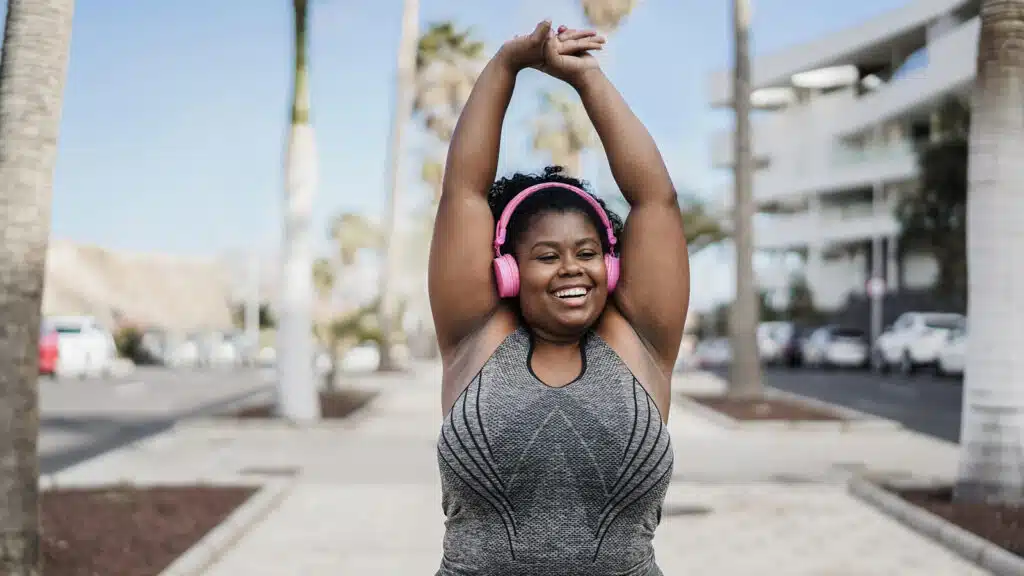The simple answer is everywhere. It takes a 3500 calorie deficit to lose one pound of fat. Just eat fewer calories every day and you will lose weight. If you want to lose a pound a week, just cut your calorie intake by 500 calories a day.
Simple.
So why do so many diets fail? To answer that question, let’s dive into the complex subject of weight loss.

How Many Calories Are In A Pound Of Body Fat?
Body fat isn’t the same thing as a tub of lard. It’s not pure fat. Instead, it’s adipose tissue made up of fat storage cells, fluids, and connective tissue.
The idea that it takes a calorie deficit of 3500 calories to burn one pound of body fat comes from Max Wishnofsky. The research was carried out in 1958 but the simplicity of the concept has lived on.
This folklore is quoted everywhere from Government publications to social media posts.
Just eat 500 fewer calories a day and watch your body weight fall by one pound a week. Lose 52 pounds in one year.
Great!
Except it doesn’t work. It can work quite well for just a few weeks, especially if your weight loss target is moderate. But if your aim is significant long-term weight loss, the eat 500 fewer calories a day rule just sets you up for failure.
Why?
Because not all the weight you lose will be body fat, some of it will be muscle mass, and as time goes on, your body gets more efficient at using calories.
Cutting Calories But Not Losing Weight
There are some big hurdles if you’re trying to lose weight purely by cutting calories:
#1 A Lower Bodyweight Burns Fewer Calories
Your daily energy needs are based partly on how much you weigh. As you lose weight, your energy needs will reduce and you’ll need fewer calories to sustain all your body functions and activities.
If you’re cutting 500 calories a day below your energy needs, your daily calorie intake needs to drop as time progresses. It becomes unsustainable.
#2 Losing Muscle Weight
If you’re losing weight purely by dieting, there’s no guarantee your weight loss will just be from losing body fat. Instead, most people lose muscle mass along with body fat – which in turn reduces your daily calorie needs.
Your body composition matters – a muscular body burns more calories daily than a body of the same weight but with a higher proportion of fat cells.
#3 Your Body Becomes An Efficient Calorie Burner
The human body is amazing. Restrict calories or subject it to a new exercise regime and your body will adapt.
This makes weight loss harder in the long term if you have a lot of weight to lose. If you’re just restricting calories, there’s no wriggle room – weight loss becomes harder and harder in today’s society of abundant food.
If you’re exercising, you can keep challenging your body so it doesn’t become so efficient. Adapt your running program as you get fitter to run further or faster.
#4 Your Body Tries To Replace Its Fat Stores
Often losing weight is the easy part. Once you’ve lost weight, your body will do everything it can to regain those fat stores. It’s called adaptive thermogenesis where your body will use all the tricks at its disposal, from metabolic to behavioral responses, to try and get you to regain weight.
It’s the reason weight loss needs to be slow and steady, building life-long good habits of healthy eating and exercise.

Calculate Caloric Needs
You can calculate your daily energy needs with our calculator. Use it to set your daily calorie goal.
When you’re aiming for long-term weight loss, it’s best not to let calorie counting take over your life.
Instead, keep a food diary for 1-2 weeks, identify some of your high-calorie habits, and come up with one or two ways of eating fewer calories.
Making small changes to your diet that evolve into life-long habits is key to success – not completely changing your diet overnight in an unsustainable way.
It could be something as small as not eating chocolate biscuits with your morning coffee. These small positive changes are the key to weight loss.
As time progresses, look for new ways to improve your diet with healthy foods – filling up on lean protein, vegetables, whole grains, and fruit instead of calorie-dense processed foods.
An alternative calculator for predicting weight loss is the Body Weight Planner developed by the National Institutes of Health. This calculator takes into account both diet and exercise reflecting how your body may respond to long-term weight loss.
How To Create A Calorie Deficit And Lose Weight
The assumption that you need to burn 3500 calories to lose one pound of body fat may be misleading but weight loss still needs a calorie deficit. You need to burn more calories than you consume to lose weight. There are three ways to do this:
Reduce Your Calorie Intake
Restrictive, calorie-controlled diets can work in the short term for weight loss. Long-term, weight loss slows, especially if you’re following a very calorie-restrictive diet.
When you follow a low-calorie diet and reduce calorie intake significantly, there’s a high risk of reducing your lean muscle mass by burning muscle as well as body fat.
This comes with the consequence of lowering your metabolism and in turn, your daily energy needs.
Studies have also shown that with rapid weight loss, levels of the satiety-inducing hormone leptin can drop and may remain reduced many months later. When you’re hungry, it’s difficult to stick to a restrictive diet.
Reduce calorie intake significantly and you may gain weight long term. The biggest challenge for most people following a calorie-restricted diet will be keeping the weight off when the diet period comes to an end.
If the diet has been purely about cutting the number of calories instead of improving nutrition, eating less junk food, and learning to cook healthy food at home – there are no healthy habits to help with weight management.
Burn More Calories
Exercise is an essential part of weight loss but it won’t solve everything. For healthy weight loss, you still need to improve your diet.
Running is one of the best ways to burn calories but you’d need to run 5 miles a day, to hit a 500-calorie deficit target – that’s too much for most new runners. Often walking an hour a day is a better option.
Adding some high-intensity running sessions can help to improve calorie burn rate but it’s often not enough to hit a 500-calorie target. Check your calorie burn with our Calories Burned Running Calculator.
Exercise helps with gradual weight loss and finding an exercise you enjoy makes it much easier to maintain a healthy weight. It’s just that exercise is only one part of the weight loss equation.
Eat Better And Exercise More
This is the best weight-loss solution. Eat more nutritious food that’s naturally lower in calories and increase your daily exercise expenditure.
Look for ways to move more. It can be any exercise or physical activity you enjoy from gardening to dancing but walking for weight loss or running for weight loss can be the most effective.
Exercise will increase your muscle mass and can increase your basal metabolic rate. Just walking 2 miles a day will help.
Eating food rich in all the vitamins, minerals, fiber, and nutrients your body needs will help you to fill full and satisfied.
Establishing healthy habits will make it easier to maintain your weight in the long term.
Related post: Is Diet More Important Than Exercise?

Why You Need Strength Training
Strength training is key for weight loss. It helps to build and maintain muscle mass, which speeds up your metabolic rate.
Building strength sets you up for life by improving balance, coordination, posture, and core strength. All are vital for life-long mobility, avoiding dreaded bad backs and exercise-induced injuries.
You don’t need to visit a gym to strength train. These bodyweight exercises for runners are ideal for building strength. Try them after your runs.
Thoughts From Love Life Be Fit
Weight loss is a journey that requires more than just one factor to be successful. To lose weight and keep it off, you need to pay attention to both your nutrition and exercise habits. Try to reduce calorie intake by eating better and moving your body more through activities you enjoy.
It helps to set goals for your weight loss and follow a training plan. Start running with Couch to 5K or one of these Running For Weight Loss Plans.
